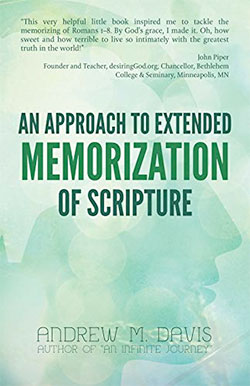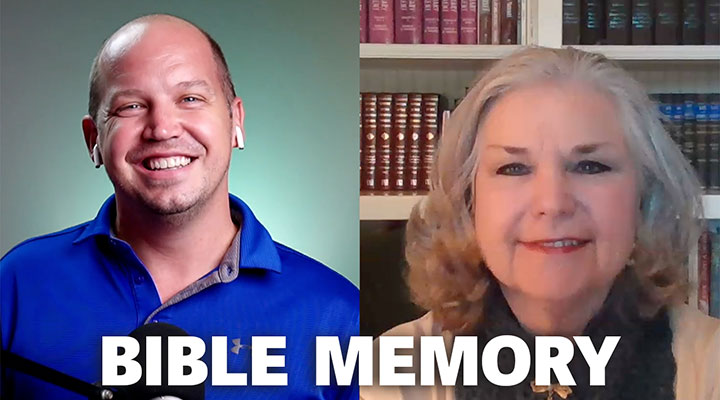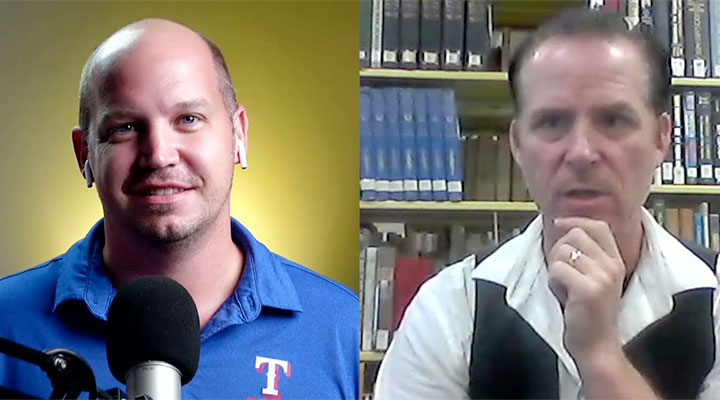One of my favorite books on extended Scripture memory was written by Dr. Andy Davis, senior pastor of First Baptist Church in Durham, North Carolina. In this interview, Pastor Davis provides both encouragement and great pieces of wisdom for those wanting to memorize the Bible. In his own words, “…it’s like buying Microsoft stock back in the 1990s.”
Or you can listen to the Memorize What Matters podcast on your favorite player:
Follow along with all the Bible Memory Goal YouTube videos!
Resources Mentioned in the Interview
- An Approach to Extended Memorization of Scripture: Dr. Andy Davis offers compelling arguments for why Scripture memorization should be a priority for any believer. I highly recommend this book, which is one of the best books on Bible memory.
- TwoJourneys.org: This is where you’ll find most of Dr. Davis’ teachings housed under one roof.
- The Glory Now Revealed: Andy’s newest book takes a look at what we’ll discover about God in Heaven.
I hope you enjoyed listening to Andy Davis share his heart about Bible memory, particularly as it relates to those in ministry!
You can find this along with other great interviews with Bible memory practitioners such as:
- Susan Heck: A lady who has memorized the entire New Testament!
- Prof. Tom Meyer: Also known as “The Bible Memory Man”, Tom shares his techniques for memorizing 20 books of the Bible.
Dr. Andy Davis is also listed as one of the few people who have memorized most of the Bible.
Interview Transcript: Dr. Andy Davis
Josh: All right, well, welcome back to the Bible Memory Goal. My name’s Josh, and I am incredibly excited, very, very honored because when I first started this journey of Bible Memory, one of the first things I did is I went onto Amazon, and I started looking at books. Books that were available that would kind of walk through this with me or prepare me. And I did come across a couple of books. Some of them were okay. Some of them weren’t the best. And this particular book by Pastor Andy Davis, who’s the pastor, a senior pastor at First Baptist Church in Durham, North Carolina. It’s “An Approach to Extended Scripture Memorization”. If you haven’t got that book, I highly suggest, and you’re looking into extended scripture memorization. I highly suggest you grab that. And it was very encouraging to me. Pastor Davis, wanted to say that to you first of all, thank you so much for that encouragement. It was great to read that book.
Andy Davis: Well, I’m excited. I’m looking forward to our conversation. There’s no topic that really just excites me like this one. So looking forward to talking with you.
Josh: Absolutely. And one of the things I like to do when I start off an interview like this is hopefully get you a little bit off guard with a question that you don’t normally get. I love Google search, right? And I search all the time. And did you know what is the first thing that comes up when you search Andy Davis? Do you know what that might be?
Andy Davis: No.
Josh: You are in competition with the little boy from “Toy Story”!
Andy Davis: Oh my goodness. (laughing)
Josh: The little boy from “Toy Story” was named Andy Davis. And he takes up like the first four or five spots. So I wanted to get your impressions of what it was like to be upstaged by a cartoon character.
Andy Davis: I’ve never seen “Toy Story”. I’ve heard good things about it, but I just have never watched it, but I think I can even see. Yeah, no, I didn’t know that. So thanks. Yeah definitely upstaged by a fictitious cartoon character. That’s fine. May my name perish and may his name increase. All I can say.
Josh: That’s hilarious. Well, one of the things that I read recently is that you had memorized at least at some point 43 books of the Bible. And I think you and I, before we started recording here you made a very important point that I kind of want you to dive into here, which is you’ve memorized at some point, at least 43 books of the Bible. Maybe it’s something at this point. So what does that mean to you and why is that important?
Andy Davis: Right, so my goal is to finish a book and to recite it for 100 consecutive days or portions of it along the way, like right now I’m in the Gospel of Mark. So I’ve farmed off the backside of like Mark 1. When I had finished a 100 days of reciting it, I stopped reciting, I just dropped it off. And so I just moved through the Gospel of Mark that way dropping off subsequently chapter 2, then 3, then 4, when I had said 100 days.
And so I just think it’s important to kiss the book goodbye. That’s what I say is like you get to a certain point. You’ve saturated your mind in it. You know it, you’ve recited it for almost a third of a year. And the reason for that is to accept your limitations, to realize you don’t have limitless capacity. And to begin another book, go one to the next book. You finish an epistle, Ephesians, go on to Philippians. Finish that, go on to Colossians, go onto something else, keep learning the rest of your life and accept your limitations.
Very few people can retain huge, huge amounts like that number of books. And then that knowledge for me has gone subterranean into my brain somewhere. It’s not lost, but I can’t recite it or remember it like I used to. It’s just the way that our brains are. We forget things, but the Holy Spirit has that information at his fingertips in my life. So when I write sermons, ideas will pop back in my mind from old books that I’ve memorized that I haven’t thought about in years.
And so the Holy Spirit has a whole arsenal of weapons or a whole array of tools to help me write sermons and to write books and different things. But I just advocate accept your limitations, kiss the book goodbye, go onto the next book.
Josh: Awesome, how long would it normally take? Like let’s say you’re in the middle of Mark right now. How long would it normally take you to get from chapter 1 to the end of Mark?
Andy Davis: So Mark is 676 verses I’ve been going at a clip of three verses a day. Since October 3rd, I’ve not missed a day. So I’m right at, I calculate 215 days, 645 verses a couple of days ago. This week I’ll finish new verses, I’ll be finished with new verses in Mark. And I’m gonna keep doing the backside, the hundred days, I’m in chapter 9 and about to drop that off on May 14th and just keep on going until August 25th. I will have finished my hundredth day of recitation in Mark 16 and then that’ll be it.
I think at some point on a Saturday, I’d like to go stand by a pretty lake and recite the whole book if I can. I’ve never done that, but it’d be fun just once to say the whole thing it’d probably take me about 90 minutes and that’d be kind of fun. No friend loves me enough to stand and listen to that or sit and listen to that, that would be a rare friend that would wanna hear that. I wouldn’t inflict my wife with it whatever, it would just be between me and the Lord and be something that would be sweet to do, run through the whole Gospel of Mark.
But then I don’t know what I’m gonna do next. So it just depends on your clip. Three verses a day has been good for me. It’s hard work. It’s about an hour a day but not all of that hour is the same. I can do a lot of review of really well-known verses that I’ve done for 80 days or 60 days, something like that in the car while I drive. It doesn’t add anything to my day. It just takes up my drive time.
So then in terms of focused energetic effort, probably no more than half an hour or less a day, maybe more like 20 minutes.
Josh: So that half an hour, that 20 minutes or that hour, like if it’s the focus time, what exactly are you doing? Are you repeating it over and over? Are you making mental images? What’s your process for that?
Andy Davis: No I don’t tend to do that unless I have troublesome verses. There are some verses that are very troublesome. I think of it like making furniture or a nice piece of wood and you’re using your fingertips and you’re rubbing over it and there’s just some rough spots and they just need some additional sanding, some additional work. Or like a musical piece, let’s say somebody who’s a soloist and there’s a particularly difficult passage of the piece. And they just can’t quite get it. And they just have to go back over and work on it. And so I’ll do some mnemonics or whatever, but it’s not my usual pattern.
Usual pattern, vanilla, run of the mill, 98% of the time. It’s just repetition over time. I read it 10 times, say it 10 times. The next day, I say it 10 times again. And then I say it once and I just put it in the machine and I just run it every day. And then after about 20 days or so I usually have it. It’s pretty good, it’s solid.
But like I said, there’s some difficult verses and maybe after 30 or 40 days some of them succumb and then they’re fine. And then maybe after 50 days, some of them I just still not, I’m not getting it. And then I’ll have to do some tricks, some mnemonics, whatever, whatever it takes to get. Well listen brother, it’s all temporary. Because you’re working, working, working, you get a flawless one day. Some Tuesday you can say it like a piece of glass, it’s perfect. A week later, you can’t. It’s just how it is, that’s the nature of our forgetful brains. But I’ve accepted that, I’ve been at this a long time.
I started in 1986, I understand what I’m going after and what I’m going after are insights, you know, those aha moments, those encounters with God through the text, those are the sweetest things of all. And then the overall sanctifying effort or effect of having scripture running through your brain constantly, being transformed by the renewing of your mind.
Josh: Yeah, I absolutely agree. I think it’s made a huge difference for me. I’ve turned my mornings that are usually a walk with my dog and still are a walk with my dog, but it’s just me reciting over and over again, whatever passage or whatever book I’m in the middle of. And it does, it makes a big difference.
And I’m a lay person, right? I’m just a lay person. I can imagine and if you can take a moment right now and maybe speak to anybody that is in ministry full time at a church. How exactly does this memory influence the way that you go about doing any sort of preparation for a sermon or anything, even writing a book or something like that.
Andy Davis: Yeah, he is absolutely incalculable. It’s just incalculable. If you know anything about, and I don’t know much about it all. But imagine thinking about investing in companies and stock, so you have an opportunity to buy 1000 shares of Microsoft stock in 1986. If you just could know where that thing’s going, you’d be a fool not to buy it, Or Amazon whenever, Google whenever. When it was really cheap and no one had heard about it, that’s how good this stock is.
That’s how good memorizing books of the Bible is. Especially for someone called to pulpit ministry. Especially for somebody who’s regular ministry is gonna be preaching the Word, you’re gonna store up books of the Bible.
And five years later, you’re gonna preach an expository series through that book. And your insights, your understanding of the book will be greater than any commentary can ever give you. You’ll be able to recite the passage that you’re preaching on just without even looking at it. You’re looking at the congregation and your prep time is greatly reduced.
Actually, it’s a misnomer. It’s not reduced, you already put it in, that’s what’s happened. You’ve already invested the time. And so when the actual time comes to write the sermon, three years later, five years later, you’ve already stored up all these insights. And then you can start working. For the most part, I would say 90% of the time I preach sermons, the sermon series, I’m a sequential expositor. So I take a book of the Bible and preach through it until it’s done. I’ve already memorized it years ago. So I’ve already done a lot of work on the book.
Right now I’m in Job and I haven’t memorized Job. It’s one of the first books I’ve done in years that I haven’t memorized. But I’ve got all these cross references that are flowing into my brain from the Holy Spirit. So for example, yesterday, I preached on Job 15 through 17, hadn’t memorized it. And I had to work on it, just like any other pastors working on those verses, trying to understand them.
And there’s some gem verses right in the middle of chapters, at the end of chapter 16, 16, 19 through 21. He yearns, he says, “My intercessor, my advocate is on high. Someone who will plead for me as a man pleads for his friend.” So all that flooded in my mind at that point was Jesus our great high priest interceding at the right hand of God and praying for us from the book of Hebrews. So like a third of the sermon was Hebrews. And I was able to say, look Job didn’t understand these things. Job didn’t know what we know now from the book of Hebrews. So I was giving them Hebrews while I have Hebrews memorized.
It was just sweet and as I wrote the sermon, it was very moving and powerful for me to say, here’s a man, Job, thrashing around in agony. The grave is a dark place. He doesn’t have the clear hope and vision we have now that Christ is risen from the dead. And we have the author to Hebrews has given us Hebrews and explained it all to us. We are able to have a vigorous sweet hope and it was all scripture memory. It was just flooding in.
And then as I preached, as I actually delivered it. It was just flowing by the power of the Spirit in a very awesome way. And it was just such an encouragement. So if you’re gonna be preaching and you’re early in your ministry, I’m just saying, look buy this stock. It’s blue chip stock.
Store up books of the Bible, you’ll not regret it. Now, if you’re in Christian counseling or if you’re associate pastor, you do youth ministry, it’s gonna be the same. You are not gonna regret the books you have stored up.
Josh: Ok, I’m going to read from a passage from your book, “An Approach to Extended Memorization of Scripture.” You said memorization is not the same as meditation, but it is almost impossible for someone to memorize a passage of scripture without somewhat deepening his or her understanding of those verses. I think you’ve already kind of touched on that here. I think my question more deals with when I’m doing memorization, that 20 or 30 minutes of intense kind of focus that you were talking about that I think any of us that is memorizing has to do.
I’ll be honest to me there’s very little meditation that’s happening or at least it doesn’t feel that way. I’m just trying to get this thing in my head. And for me, maybe the meditation might come afterwards as I’m reciting it to myself. But I was curious like for you how does that all come together with the meditation of scripture?
Andy Davis: I would actually take the word “almost” out where I said it’s almost impossible. I actually think it’s impossible. If you follow this approach, the meditation will happen on the recitation in the hundred days. That’s when it happens. Not when you’re saying it 10 times, that’s mechanical, you’re just getting the sound of the words grilled, you know, just engraved in your brain. So that’s not all that fun and it’s just hard work.
But then when you’re reciting the whole chapter and you’re saying it more normally, I’m telling you over those hundred days, I think it’s impossible for a spirit filled, born again person to not have some insights. Things are gonna hit you like, wow I actually hadn’t thought of…
Let me give you an example. In Mark’s gospel, the account of Peter’s denial talks about the rooster crowing twice. Matthew doesn’t mention twice, it’s Mark that mentions the rooster crowing twice. Whenever you have additional details in a synoptic problem, where Matthew and Mark are a little different, whatever additional information in an errant just accepts. Just it’s true. It’s just that Matthew just truncated that additional information.
Is there one person in the tomb or two persons? You can have one and not mention the other. That’s not a denial of an errancy. So there are two persons because John says there were two angels, one at the head, one at the foot, et cetera.
So here you got the rooster crowing twice. When Peter denies him for the third time it says in Mark 14:72, immediately the rooster crowed twice then Peter remembered. What did he think when the rooster crowed the first time? I never thought that thought before, it never hit me before. He blew right through that morning, he blew right through that stop sign. And it was just a warning to me. It just showed me that the Holy Spirit warns us sometimes. He puts his hand up, stop what you’re doing and we blow through those stop signs. And so part of the purpose of scriptures that we would understand ourselves in our sin nature and see what we’re like, and say we’re no different than Peter.
And I don’t know, it was just a detail. I’m just saying it popped in my head at one point it’s like wonder what he did between the two rooster crowings. And it was just a new thought.
Well, how many of those have I had? They’re literally countless. Over the 43 books I’ve worked on, 44 now and I’m in Mark. I can’t tell you the number of aha moments of insight. That’s basically meditation that’s (indistinct).
Josh: I love that. That’s an excellent story. I appreciate that. If someone was approaching this conversation right here, they’re interested in Bible memorization. 43 books is a little bit overwhelming obviously to think about, but they’re just trying to figure out the best place to start. Would your recommendation be to start with a smaller book or to start with more of a narrative? SoMe chapters in one of the gospels, where would you probably point someone to?
Andy Davis: Yeah, I would say you wanna start probably if you’re just getting going, it’s kind of like the old adage you gotta walk before you can run. So you gotta run a 5k before you run a 10K, you gotta run a 10K before you run a marathon. But some people dive right in and do a marathon, I guess, I don’t know. I think a marathon’s ridiculously long. I mean, 26 miles. I ran cross country in high school. I think that’s crazy, but people do it.
I guess would say if you start with the Gospel of John and you’ve never memorized anything before and it starts to load you up and you’re getting tired and you’re getting fatigued and you will. And you’re in chapter 6 and there’s like 15 more chapters to go. It’s gonna be just easy to give up. And I’m just saying the enemy, the only enemy of memorization is giving up.
So you’re just more likely to give up if you can’t even see the light at the end of the tunnel. But if you’re doing Ephesians or Philippians you’re cranking away and you’re in chapter three and you’ve got two chapters behind you and you’re more than halfway done. It’s like hey, don’t give up, keep working at it. And then you store up three or four or five, six epistles. And you realize that adds up to a gospel. Then you’re like, look if I can do those six epistles, I can do a gospel and then you’ve got that. You’re a veteran now you can get at it.
I would just say, start with something that’s short enough that you can see the light at the end of the tunnel within a few months. But it also has to engage you. It has to be something you’re excited about something that’s going to stimulate you.
I’m not gonna disparage any scripture, but honestly 2 John and 3 John, it’s just interesting how it’s in the canon. You read it and you’re like, huh, there’s not a lot there. There’s some details and it’s cool, you can get that done in a week or two and do it. If that’s what you wanna start with, it’s like, hey I got a book of the Bible memorized, what is it, 2 John. Well, congratulations. (laughing) Or Obadiah, 25 verses, it’s a minor prophet. It’s just detailing Israel’s history. I’m not gonna disparage it.
I would start with Ephesians. I think that’s a great place to start, because there’s a lot of rich theology, lots of rich practical application in the second half, the last three chapters, Ephesians 4, 5 and 6. Great stuff, Ephesians 4 almost reads like a book of Proverbs for the Christian life. Then chapter 5 will give you more of the same. And then you get the marriage section on husbands and wives and then you get spiritual warfare in chapter 6, and then you’re done. And it’s a very encouraging book, 155 verses, six months, verse a day, you can get it done.
Josh: That’s great. You’re basically describing me to a T. I was the guy that started off with Philemon because it was 25 verses and I just needed that quick win, you know? And then I’ve worked my way through a number of epistles. And I think I’m about ready to jump into one of the gospels or Acts or Romans or something, something that’s a little bit longer, but it’s exactly like you said. It’s building that confidence. It’s building that confidence to know that it is possible. I can do it. And those little wins help along the way so that’s great.
Andy Davis: They do! And also what happens is at some point it flips and it isn’t about finishing anymore. It really isn’t, it’s about the journey. It’s about what you’re learning in Mark 9 today. It really has nothing to do with how much longer it’s gonna be until you’re done. Because the goal isn’t getting done, because honestly when I get done, I’m not gonna say Mark anymore. And so that’s not even my goal anymore.
And the 43 and 44, I don’t find that all that helpful. I say it in these contexts, but people get daunted and they think well, I could never do that. And they give up and they say, well I can never do that. It’s like look, God has given me a gift and a calling. That’s something that pertains to me. That’s something He gave me years ago and I’ve been at it all this time.
I guess my gift is perseverance, that I just didn’t give up. I just kept working at it. But for me, what enabled me to do it was, along the way, you just love scripture. And actually you don’t even love scripture anymore. You love the God of scripture. You love the triune God of the Bible. You love the Father and the Son and the Spirit. That’s what happens. And so it’s not about finishing anymore. It’s not about achievement. It’s not about telling your friends, none of that. It’s about an encounter with Jesus today in Mark 9. That’s what it is.
Sorry, it gets me emotional. That’s how I fellowship with Christ today is that.
Josh: And I think, I can’t remember if it was in your book that I read this or somewhere else, but it’s you get to the end of life and there will not be a time that you regret the time spent memorizing scripture and putting that in your mind.
Andy Davis: Yeah that’s something I wrote. You may have heard it elsewhere, it’s not gonna burn up like wood, hay and stubble. It’s gonna be there. And really, I think you’re just gonna say that was one of the best things I ever did. I don’t think it would have harmed me to have done it more. So anyway.
Josh: Absolutely, well, if you’re watching this right now I do encourage you, “An Approach to Extended Scripture Memorization,” I’ll have a link to that in the description below this video. I was just browsing online. You’ve got something called TwoJourneys.org or would you rather send somebody somewhere else if they’re interested in more of your stuff?
Andy Davis: No, no, that’s the place to go. That’s the repository of what I’ve done, since 1998 being pastor at First Baptist church, I’m a sequential expositor so I preach through many books of the Bible. I’ve also written books, articles. We’ve done a number of podcasts, my PhD is in church history.
So I’ve done some podcasts on church history. So please go to TwoJourneys.org. That is the place to get all of this stuff, the Internet’s all about free stuff. So that’s what it is, just free. And just go there and benefit from it. And I’m not saying that in any way to put myself forward, I’ve tried my best to just get out of the way of the scripture. And so what you’re gonna find there is responsible, exegesis of passage after passage of scripture. That’s what I’ve sought to do.
Josh: That’s awesome. Well, yeah, the link to TwoJourneys, I mean it’s TwoJourneys.org, but I’ll have that in the description as well. Pastor Davis, thank you so much. I appreciate your time and your insight and just everything you’ve shared.
Andy Davis: Well, it’s a delight to meet you and to see what you’re excited about. And here’s the thing, one last thing. Paul says in 1 Corinthians 13, “We see through a glass darkly, someday we’re gonna see face-to-face.” So it’s awesome for me as incredible as scripture meditation, memorization, preaching, teaching has been, seeing Jesus with our own eyes will be infinitely better.
And that blows me away ’cause the journey and scripture has been incredible, but heaven is going to be much better. Just wanna put in a plug, I finished a book on heaven that Baker Books is gonna publish in October. So look for that. It’s one of the most exciting studies I’ve ever done on what heaven’s gonna be like. I’m looking forward to it.
So thank you for the time. It’s been great to know you, Josh.





Leave a Reply